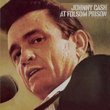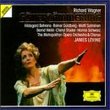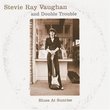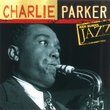| All Artists: J.S. Bach, Casals Title: J. S. Bach: The 6 Cello Suites Members Wishing: 0 Total Copies: 0 Label: EMI Classics Release Date: 9/16/1997 Genre: Classical Styles: Chamber Music, Historical Periods, Baroque (c.1600-1750), Modern, 20th, & 21st Century, Instruments, Strings Number of Discs: 2 SwapaCD Credits: 2 UPCs: 724356621527, 724356621558 |
Search - J.S. Bach, Casals :: J. S. Bach: The 6 Cello Suites
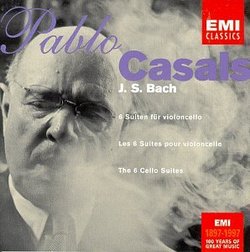 | J.S. Bach, Casals J. S. Bach: The 6 Cello Suites Genre: Classical
Casals crusaded for this music. When he first picked up a used copy of the score in a music store, Bach was not very popular with general audiences, and the cello suites were never played in public. If cellists knew them a... more » |
Larger Image |
CD DetailsSynopsis
Amazon.com essential recording Casals crusaded for this music. When he first picked up a used copy of the score in a music store, Bach was not very popular with general audiences, and the cello suites were never played in public. If cellists knew them at all, they used them as finger exercises. After two decades of study, Casals finally gave his first public performances of the suites. For all we know, they may have been the world premieres. Casals thoroughly mastered the music, and by the time he made his recordings, in the 1930s, he gave mature, adept, and loving performances. If his style seems a bit on the romantic side for our 1990s conception of Bach, it is never offensively so. Every music lover should hear this set, with recorded sound that holds up remarkably well. At the same time, we can now realize that Casals sometimes works too hard to make a point, probably knowing that most of his listeners had never heard the music before. So we should also hear more recent recordings of these suites (especially Starker's on RCA) for a more inward, subtle version of the music, which is too great to be fully realized in any one performance. --Leslie Gerber Similarly Requested CDs
|
CD ReviewsDon't buy this 08/30/2000 (1 out of 5 stars) "This is one of the great recordings of all time, but the sound is so poor... And EMI is to blame. They filtered the original tapes to get rid of the 1930s-noise, and en passant they ruined the cello sound. The same recordings are available on Pearl, unfiltered, and then you can hear from the warmth and wealth of colors in his playing that Casals really was the greatest of cello players." Outstanding (of course), but sound quality a big minus 02/22/2000 (4 out of 5 stars) "In the words of Rostropovich himself, Casals is unequalled when it comes to virtuosity. This is felt throughout this recording.I am still having a hard time with the sound quality of this CD though. Not much to expect from a recording done in 1936-1939 I guess. But it still bugs me when listening, and quite frankly this only makes me prefer other versions.What I really recommend: get this edition, "the" original one. But also get on EMI Classics Mstislav Rostropovich's version. Rostropovich's play is very close to Casals'; but the 1991 recording will give you outstanding sound quality on top." Why I took up the cello Carlos Fuentes y Espinosa | 10/11/1999 (5 out of 5 stars) "I listened to this day and night. . .I found the score and got up at 5.00 to practice it (maybe that doesn't seem early to you, but I am not a morning person). It's wonderful to see a piece where the cello is not reduced to a minor accompanying part. Genius. Absolutely."
|

 Track Listings (18) - Disc #1
Track Listings (18) - Disc #1
